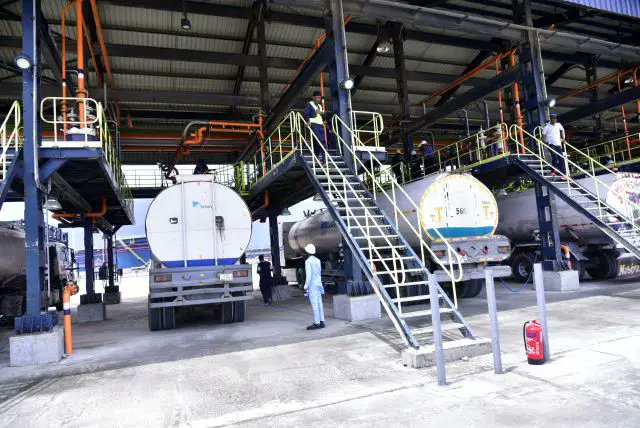The ongoing suspension of fuel loading by tanker drivers at the Dangote Refinery in Lagos has sparked concerns over a potential fuel and cooking gas scarcity across Lagos and southwestern Nigeria. The drivers, backed by the Independent Petroleum Marketers Association of Nigeria (IPMAN) and the Nigerian Association of Road Transport Owners (NARTO), are protesting the Lagos State Government’s enforcement of a N12,500 levy per truck under the E-call-up system along the Lekki Port corridor. This action, which began in early February 2025, has disrupted the supply chain, with some filling stations already closing due to depleted stocks.
The E-call-up system, introduced to streamline truck movements and prevent traffic gridlock similar to Apapa’s, requires trucks to pay the levy to access the Lekki corridor, a critical route for transporting fuel from the refinery. IPMAN and NARTO argue that the fee is excessively high, proposing a reduction to N2,500 to ease the financial burden on drivers and marketers. The associations claim that the levy, combined with other operational costs, could drive up fuel prices, further straining consumers already grappling with economic challenges.
The Lagos State Government defends the E-call-up system, stating it is essential for managing the heavy truck traffic around the Lekki Free Trade Zone, where the refinery is located. Officials argue that without regulation, the corridor risks severe congestion, which could disrupt port operations and local commerce. However, tanker drivers and marketers warn that the continued standoff could escalate into a nationwide fuel crisis if the government does not address their concerns promptly.
The protest has already caused significant disruptions, with reports indicating that many fuel depots in Lagos are running low on supplies. IPMAN’s Lagos Zonal Chairman, Mr. Gbenga Oluwole, stated that the suspension has led to a backlog of unserved orders, affecting both fuel and cooking gas distribution. He emphasized that the refinery’s role as a major supplier makes the situation particularly dire, as alternative sources may not meet demand quickly enough.
Stakeholders have called for urgent dialogue between the Lagos State Government, IPMAN, NARTO, and the Dangote Refinery management to resolve the impasse. NARTO’s National President, Alhaji Yusuf Othman, highlighted that the levy’s cumulative impact on transport costs could render fuel marketing unprofitable, potentially forcing operators to pass costs onto consumers. He urged the government to consider a fee reduction or exemptions for fuel trucks to avert further economic strain.
The Lagos State Government has acknowledged the concerns but insists that the E-call-up system is non-negotiable for maintaining order in the Lekki corridor. A spokesperson for the state’s Ministry of Transportation noted that the system has reduced traffic incidents by 40% since its trial phase in 2024. However, the government has expressed willingness to engage in talks to find a mutually acceptable solution, with a meeting scheduled for mid-June 2025.
Industry analysts warn that prolonged disruptions could have far-reaching consequences, including price hikes and supply chain bottlenecks across Nigeria. The Dangote Refinery, with its capacity to produce 650,000 barrels per day, is a cornerstone of Nigeria’s push for energy self-sufficiency, making the current standoff a critical issue. Smaller marketers, already struggling with tight margins, fear they may be forced to shut down if the situation persists.




